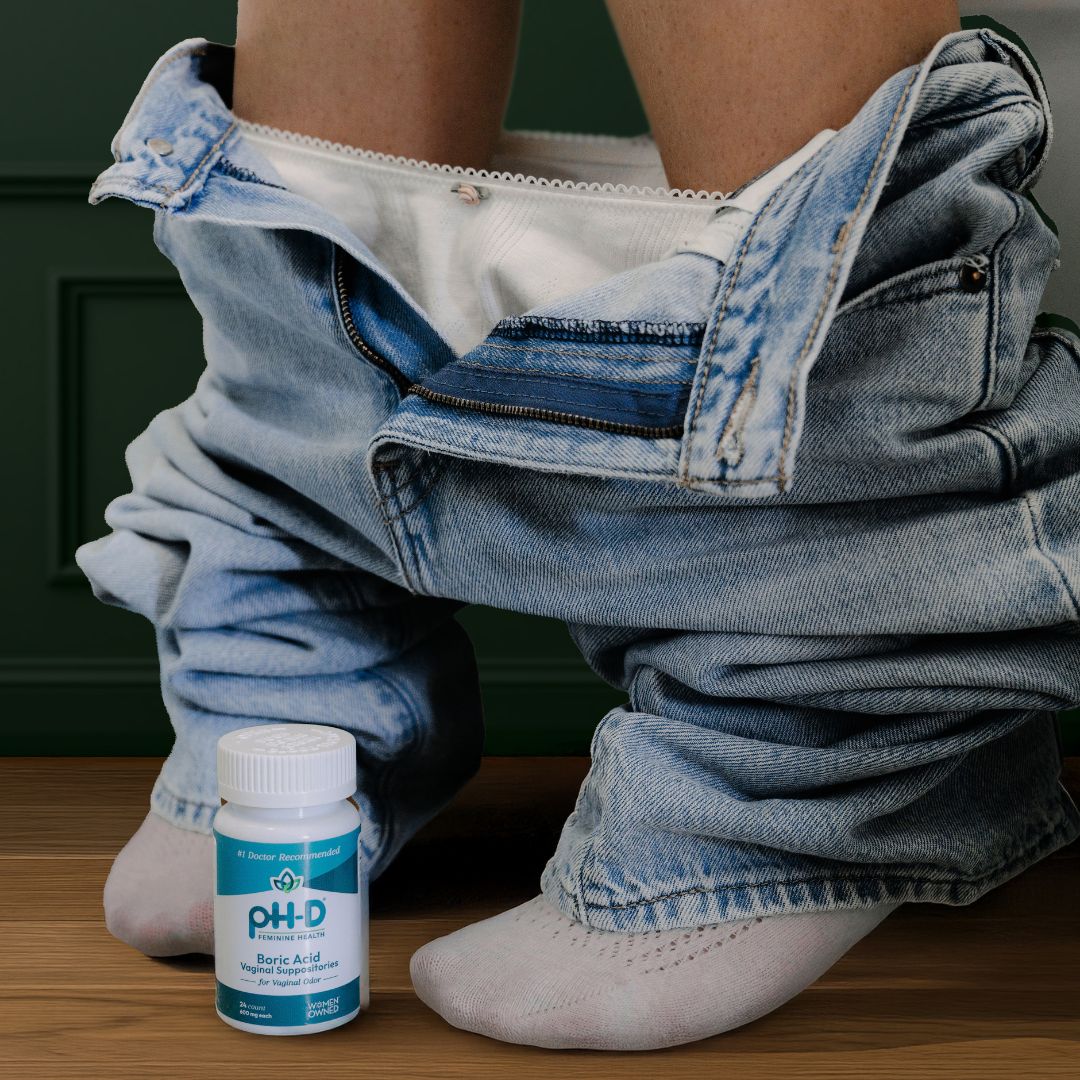Gut Health for Women: Support Your Microbiome
Key Takeaways
- Your gut microbiome is a dynamic ecosystem that impacts digestion, energy, skin, and even vaginal health.
- Signs of imbalance can show up in sneaky ways like bloating, brain fog, cravings, or feeling off "down there."
- Daily support through fiber, sleep, and a women-specific probiotic can help keep your microbiome in check.

Gut stuff doesn’t usually come up in group chats, but maybe it should. Feeling bloated for no clear reason? Suddenly gassy after lunch? Just feeling off? Your gut might be trying to get your attention.
The truth is, your microbiome has a lot going on. It’s made up of trillions of bacteria doing behind-the-scenes work to help you feel your best. When things get out of balance, your body tends to notice.
At pH-D Feminine Health, we’re here to make sense of it all without overcomplicating it. If “support your gut” feels vague, don’t worry, we’ve got you. Let’s break down what your microbiome actually does, what throws it off, and how to give it the daily support it deserves.
What Is the Microbiome?
Your microbiome is the collection of trillions of bacteria living in your gut. That might sound intense, but it’s completely normal. In fact, these bacteria are essential. Some help break down food, some produce important nutrients, and others help maintain balance so things stay comfortable and predictable.
Your microbiome is shaped by all kinds of things: your diet, your sleep, your stress levels, even where you live. When the helpful bacteria are thriving, your gut runs more smoothly. When that balance shifts, things can start to feel off.
Think of it like a tiny ecosystem that works best when everything’s in sync. You don’t need to micromanage it, but a little daily support can help keep things on track.
What Are the Signs Your Gut Microbiome Is out of Balance?
Now that you know what the microbiome is, here’s where it gets personal. These bacteria do more than just support digestion; they influence how your body reacts, recovers, and resets. When the balance shifts, you usually feel it, sometimes in obvious ways, and sometimes in more subtle ones.
The signs can look a little different for everyone, but here are some common ways your body might be telling you something’s not right:
-
Bloating or gas that doesn’t seem tied to what you ate: A little occasional puffiness is normal, but if you’re constantly bloated or gassy, especially after eating, your gut bacteria might not be breaking things down efficiently.
-
Irregular digestion: Too many trips to the bathroom? Not going enough? Your gut plays a key role in keeping things regular. If you're bouncing between extremes, your microbiome could be struggling to keep up.
-
Low energy or brain fog: The gut helps with nutrient absorption, which supports energy and focus. If your digestion feels sluggish, you might feel mentally or physically drained too.
-
Skin changes: Breakouts, dryness, or unexpected sensitivity could sometimes trace back to your gut. The gut-skin connection is real, and when your microbiome is off, your skin can show it.
-
Feeling off "down there": The gut and vaginal microbiomes are connected. If you’re noticing discomfort, odor, or changes in discharge, your gut balance might be playing a part.
-
Weird food cravings or appetite changes: Gut bacteria can influence the way you process sugar, carbs, and fat. If your cravings feel all over the place, or your appetite is shifting for no clear reason, your microbiome may be part of the picture.
These signs don’t always mean something serious is going on. But if a few of them are hitting at once, it might be a good time to show your gut some love.
How Can You Support Your Gut Microbiome Daily?
If you’ve picked up on some signs that your gut might be out of balance, you don’t need a total life overhaul. A few small shifts can make a big difference.
Here are a few easy, everyday ways to help support a healthier, more balanced microbiome.
Eat More Fiber
Fiber feeds the good bacteria in your gut. When you eat a variety of fiber-rich foods, like fruits, veggies, beans, oats, and whole grains, you’re helping those helpful microbes thrive. What matters just as much as fiber? Variety.
Different types of bacteria like different types of fiber, so switching it up from day to day can help your microbiome stay diverse and strong. More fiber usually means more regular digestion, too.
Sleep Like It Matters
Your gut and your sleep are more connected than they seem. Poor sleep can mess with your gut bacteria, and a disrupted gut can mess with your sleep. It’s a loop.
Getting enough rest (seven to nine hours if you can swing it) helps regulate your circadian rhythm, which also helps keep your digestion and metabolism more consistent. Start by setting a consistent bedtime and cutting back on screens before bed; you’ll likely feel the difference within days.
Try a Daily Probiotic
Probiotics are live bacteria that help support the balance of your gut microbiome. They can help fill in the gaps when your good bacteria need a boost, especially during times of stress, travel, or dietary changes.

At pH-D, we formulated our Women’s Health Probiotic to do more than just support digestion. It’s designed to help maintain gut, urinary, and vaginal health in one daily capsule. It contains 4 billion CFUs plus cranberry and a prebiotic blend, and you can take it any time: morning, lunch, or before bed. It’s an easy addition to your routine with big benefits.
Frequently Asked Questions
How long does it take to see changes when you start supporting your gut?
It depends on your body, your habits, and how off-balance things were to begin with. Some people feel a difference in just a few days, especially with things like bloating and digestion. It might take a few weeks for deeper shifts, like more consistent energy or skin changes. Daily support and consistency are key. Think progress, not overnight results.
When should you talk to a healthcare provider about gut symptoms?
If you’re constantly uncomfortable, in pain, or your symptoms are getting worse instead of better, it’s time to reach out. Things like severe bloating, ongoing constipation or diarrhea, blood in your stool, or sudden weight changes are signs you should check in with a medical provider. Supporting your gut is important, but so is getting the care you need when something feels off.
Can your period mess with your gut?
Yes, it definitely can. Hormonal shifts before and during your period can affect digestion, appetite, and how your gut feels overall. Bloating, cramping, and irregular digestion around your cycle are all pretty common. Supporting your gut daily can help smooth things out during those hormonal highs and lows.
Your Gut Deserves Attention
Your gut has a bigger impact than most people realize. When it's supported, you feel clearer, lighter, and more in sync. When it's off, you usually feel that too, even if you can’t always explain why.
At pH-D Feminine Health, we’re here to help you notice those signals, understand what they mean, and actually do something about them. You don’t need to overhaul your life to support your microbiome. You just need a few steady habits, some real information, and options that are actually made for women.
Not sure where to start? Take our quiz to learn more about your gut and vaginal health, and get simple, personalized steps to help you feel your best.
Sources:
Microbiome | National Human Genome Research Institute
Effects of Gut Microbes on Nutrient Absorption and Energy Regulation | PMC


